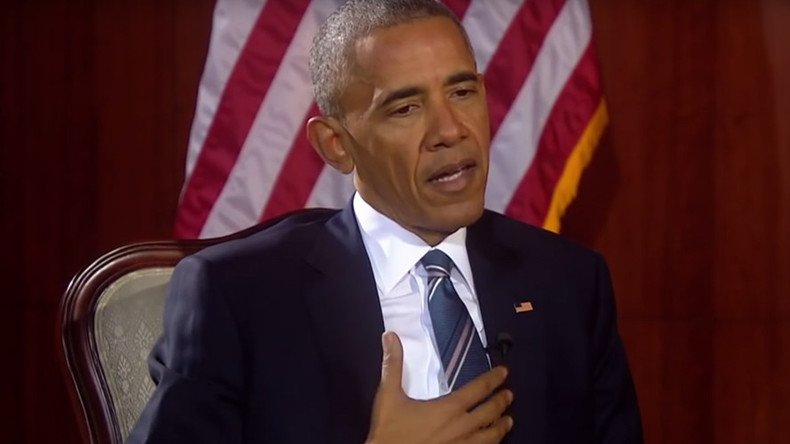Obama says he ‘can’t pardon’ Snowden unless whistleblower goes to court

President Obama gave an interview to German media outlets Spiegel and ARD during his visit to Berlin, in which he discussed divisions in the US, his darkest moments as president, and whether Edward Snowden would be pardoned.
Reflecting on Trump’s victory, Obama pointed to an “underlying division” in the US that has to do with economic growth, stagnation, and cultural and demographic issues – anxieties that Trump tapped into.
“I mean, there were probably millions of voters who voted for me and supported me and this time also voted for Donald Trump, and it just indicates that some of this is less ideological and more just an impulse towards some sort of change,” he told Spiegel.
'It is in our interest to work with Russia and obtain their cooperation' - Obama https://t.co/RZk3Hhn6Ct
— RT (@RT_com) November 19, 2016
Obama said that, while young people in America “believe in tolerance” and integration, they are less likely to vote, and consequently “sometimes the elections don’t fully reflect the views of the American population.”
“Essentially, the president-elect was supported by about 27 percent of the American population,” he pointed out.
The president believes that addressing “legitimate economic concerns of those who feel left behind by globalization” would reduce tensions and make the world less divided.
When asked if he would pardon Edward Snowden, Obama said, “I can’t pardon somebody who hasn’t gone before a court and presented themselves, so that’s not something that I would comment on at this point.”
"We are living in an age of atomic computer science": #Snowden on elections, maintaining privacy in the #Trump era https://t.co/stZtjBWezSpic.twitter.com/0aQcgxYGsr
— RT America (@RT_America) November 11, 2016
“I think that Mr. Snowden raised some legitimate concerns. How he did it was something that did not follow the procedures and practices of our intelligence community," he added. "If everybody took the approach that I make my own decisions about these issues, then it would be very hard to have an organized government or any kind of national security system."
When Obama says he "can't" pardon @Snowden he is not telling the truth and knows he is not telling the truth https://t.co/os7HfoIJID
— WikiLeaks (@wikileaks) November 20, 2016
Obama went on to highlight the need to balance privacy and security. “Those who pretend that there’s no balance that has to be struck and think we can take a 100-percent absolutist approach to protecting privacy don’t recognize that governments are going to be under an enormous burden to prevent the kinds of terrorist acts that not only harm individuals, but also can distort our society and our politics in very dangerous ways,"he said.
He went on to add that “on the other hand, it’s important to make sure that governments have some checks on what they do, that people can oversee what’s being done so the government doesn’t abuse it.”
Snowden: Fear of terrorism used as ‘legislative magic wand’ for surveillance https://t.co/PKDUh2T9zVpic.twitter.com/ax7w0ImNuW
— RT (@RT_com) November 18, 2016
The interviewers also asked Obama what he considered the darkest moment of his presidency, saying that in Europe people would point to “drone attacks, Guantanamo,” terrorism, and shootings.
Obama listed the economic crisis and the shooting at Sandy Hook Elementary School, where 20 children were shot, as low points.
“I’m very proud of the fact that we ended torture,” he said. “It’s true that I have not been able to completely close Guantanamo, but we’ve drastically reduced the population from 700 or so to around 60 now, and I am going to continue in these two months to make every effort.”
On drones, Obama commended his administration for having “constrained their use,” and said the alternative would be “to invade these countries where there would be much greater loss of life.”












